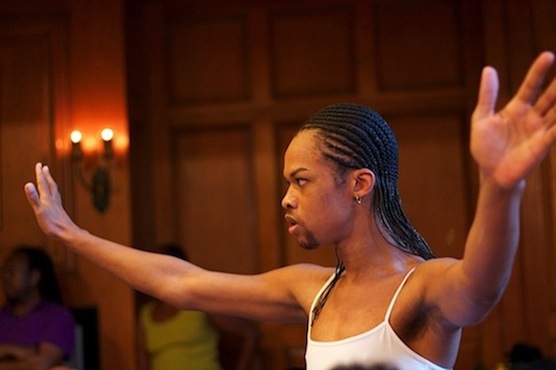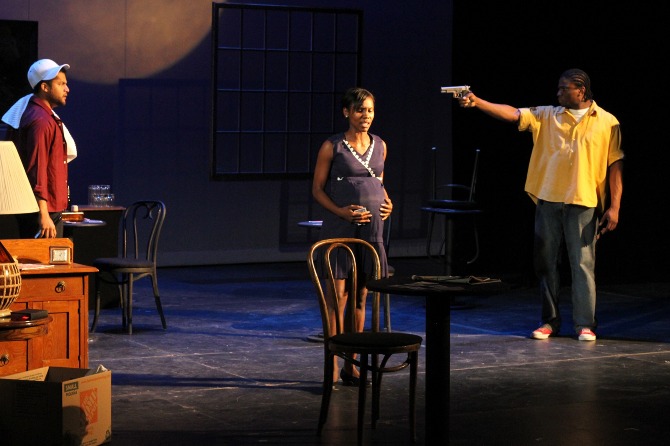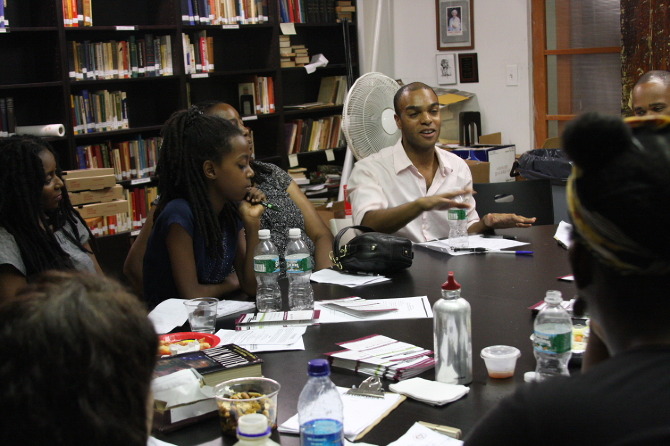|
Jacqueline Lawton: Give us a little background on where you’re from originally, where you grew up, and how you ended up where you are now…
Andre Lancaster: Sure! I was born and raised in Houston in a predominately African American neighborhood called South Park--that is as far removed from middle class suburban farce as you can imagine. My father and pretty much all of the parents on my block come from the stock of black folk who got a piece of the American dream through careers in government (in my father's case the US Postal Service.) Between Houston and NYC, I was living in Austin where I was in school at UT-Austin taking classes in hmmm let's see... Anthropology, African American Studies, Critical Race Studies, Italiano, and oh yes Theater too. But there was this cowboy living there at the time who totally pulled my attention away from my classes there. You might know him too. His name was George W. Oh those cowboys; they really know how to sweep a country off her feet. So I ended up absconding from Texas and coming to NYC. I like to say I unofficially earned a bachelor's degree through my work producing black queer theater in NYC community centers and black box theaters, while I officially officially earned it last fall at SUNY New Paltz. JL: Why did you decide to get into theater? Was there someone or a particular show that inspired you? AL: That's a great question. You know I think back to August 1997 when Reverend Jesse Jackson Jr. came to UT-Austin and rallied faculty, staff, and students (including a certain eyes wide open, skinny black kid from South Park in his very first week of college.) At the time the campus was in a heated debate over a Law School professor's inflammatory remarks against affirmative action. We've all heard the Rev's voice before but hearing him fire it up in person and in front of an audience of 5,000 sent chills down my spine. After that, I became super active in campus activism. This fueled my involvement in a student of color theater company that you might know a little something about: Drive By Players. (Okay folks, the cats out of the bag. Jackie and I went to school together back in the day!) Since then my work, especially at Freedom Train, has been trying to recapture and produce moments on stage that like that rally with Jesse Jackson have a political urgency to them and that are also really personal too. JL: You are the Founding Artistic Producer of Freedom Train. Starting a theatre company isn’t easy! What inspired you and what do you hope to achieve? AL: First of all I have got to take the time to thank the Soros Foundation and the NYU Wagner School for Public Service for awarding me their 2006 NYC Social Justice Fellowship which is a two year grant that seeds the work of promising social justice and arts leaders. Without out that award Freedom Train would not where we are today. Freedom Train's mission is all about advancing new understandings of our shared humanity through plays spotlighting black queer perspectives. And we are a black queer theater that very much comes out of the black tradition of honoring the folks whose shoulders we rest on; and considering the legacy of slavery and homophobia, too much of our history has been enslaved and violated. There's a reading series at Freedom Train however that's changing that. With Fire! New Play Festival we've produced fifteen new black queer plays since 2006 including the work of Sharon Bridgforth, Jerome Parker, Ayanna Maia, and Harrison David Rivers. I took the name Fire! from a Harlem Renaissance era literary journal of the same name published by Langston Hughes, Zora Neal Hurston, and others. Their short lived journal was dogged by some intolerant prognosticating types mainly because the future Langston and Zora saw included cultural spaces like Fire! that foregrounded sexuality and gender. You ask what was my inspiration? Well there it is... Fire! JL: What is unique about being an artist where you live? AL: At Freedom Train, we have not one, but TWO black queer Buddhist playwrights: Jesse Cameron Alick and Aurin Squire. Count 'em! JL: Who nominated you to be a Young Leaders of Color Award Recipient? AL: The one, the only Claudia Alick, Associate Producer at Oregon Shakespeare Festival. JL: What excited you most about taking part in the conference and the program? AL: All of my fellow Young Leaders of Color! I just think that this year's group is such a courageous and delightful bunch. After we did the values session together on Tuesday and over the five days of the conference, it was really cool to walk with you all especially after having done that session together. JL: What was the most valuable lesson you learned from the conference? AL: You've got to produce the conference. Well not literally! But I mean assume an active role in making the conference a success, build relationships, ask yourself what ideas are in the air and how can you support those ideas and also add ones that you think may be of use to folks. You can't just sit back and be in the audience at a conference like TCG. It was cool to have so many people come up to me and share their own reflections to that crazy candy wrapper challenge I made during the sustainability plenary. JL: What are some of the challenges you have faced as an artist of color? What have you learned from these experiences? AL: I think part of it has been my own baggage and part of it has been structural and systemic challenges much bigger than me or another single person. I remember before I started Freedom Train I spent a lot of energy advocating for black queer voices on stage in one-on-one conversations after shows and at coffee shops with friends and stuff. But since 2006 I've been an advocate and, importantly, a producer of black queer theater. (I'm careful to not frame what I was doing pre-2006 as "complaining" because I feel that plays into the angry artist of color stereotype, and I think it's more complicated than that.) I can definitely see a trajectory of my work beginning with hope for more black queer theater in that complaining... er advocacy period :) and since 2006 starting to lead to real change and black queer theater that's actually happening and in front of folks. JL: What advice do you have for other young artists of color in the theatre? AL: Think outside the box and share that thinking with your peers in the room. Good theater results from surprises not secrets. JL: What’s up next for you and where can we keep up with your amazing work? AL: At Freedom Train me and two co-editors, Aurin Squire and A-lan Holt, are collaborating on a book project featuring the five years of black queer theater that Freedom Train has developed. In the fall I'm dramaturging at The Lark Play Development Center and in the room with director Isis Misdary and Public Theater Emerging Writer Jerome A. Parker's adaptation of Genet's Querelle. And last but certainly not least I'm at The Foundry Theatre this coming season as their 2012-13 Thomas Proehl Producing Fellow. We've got Brecht's The Good Person of Szechwan directed by Lear deBessonet and starring Taylor Mac up at LaMama in February 2013. Find me on Facebook, tweet me @AndreLancaster or email me at [email protected]!!
0 Comments
Your comment will be posted after it is approved.
Leave a Reply. |
My BlogI'm a playwright, dramaturg, and teaching artist. It is here where you'll find my queries and musings on life, theater and the world. My posts advocate for diversity, inclusion, and equity in the American Theatre and updates on my own work. Please enjoy!
Categories
All
Archives
June 2020
Reading List
|



